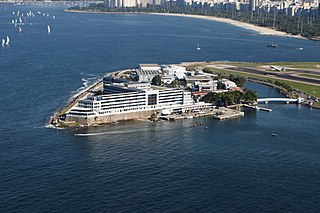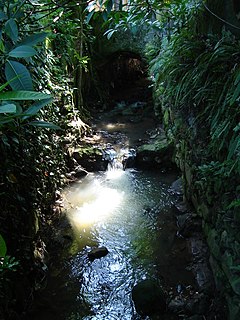
Rio de Janeiro is one of the 27 federative units of Brazil. It has the second largest economy of Brazil, with the largest being that of the state of São Paulo. The state, which has 8.2% of the Brazilian population, is responsible for 9.2% of the Brazilian GDP.

Guanabara Bay is an oceanic bay located in Southeast Brazil in the state of Rio de Janeiro. On its western shore lie the cities of Rio de Janeiro and Duque de Caxias, and on its eastern shore the cities of Niterói and São Gonçalo. Four other municipalities surround the bay's shores. Guanabara Bay is the second largest bay in area in Brazil, at 412 square kilometres (159 sq mi), with a perimeter of 143 kilometres (89 mi).

The State of Guanabara was a state within the Fourth Brazilian Republic from 1960 to 1964, and the Federative Republic of Brazil from 1964 to 1975. It included the city of Rio de Janeiro. The state was established in 1960, replacing the Federal District of Brazil, and existed until 1975, when it was incorporated into the State of Rio de Janeiro, becoming the municipality of Rio de Janeiro.
Nova Iguaçu is a municipality in Rio de Janeiro state in Brazil.

Rio Comprido is a neighborhood located in the center (Centro) of Rio de Janeiro city, in Brazil. It borders the Catumbi, Estácio, Praça da Bandeira and Tijuca neighborhoods.
The Taça Guanabara, or Guanabara Cup, is a football tournament organized annually since 1965 by the Rio de Janeiro State Football Federation. In its first four editions, the Taça Guanabara was a tournament in its own right, unrelated to the Rio de Janeiro league, and the winner would represent Rio de Janeiro in the Taça Brasil de Futebol national league competition. From 1969 onward, the cup became the first round of the Rio de Janeiro state league.
Taça Rio, or Rio Trophy, is an annual Rio de Janeiro football tournament. It is the second stage competition of the Campeonato Carioca, the state football championship in Rio de Janeiro. It has been organized since 1982 by the Rio de Janeiro State Football Federation.

The Naval School is a higher education military academy which aims to train officers for the Brazilian Navy. It is located in Rio de Janeiro, on Villegagnon Island just inside of Guanabara Bay.

Itaboraí is a city in the state of Rio de Janeiro in Brazil, that belongs to the Rio de Janeiro metropolitan area. It was founded in 1672. In 2020, it had a population of 242,543.

The Federação de Futebol do Estado do Rio de Janeiro, usually known by the acronyms FERJ and FFERJ, manages all the official football tournaments within the state of Rio de Janeiro including the Campeonato Carioca, the Campeonato Carioca Série B1, the Copa Rio, and the Campeonato Carioca de Futebol Feminino. It was founded in 1978.

Resende Futebol Clube, commonly known as Resende, is a Brazilian professional football club in Resende, Rio de Janeiro. The team compete in Campeonato Carioca, the top tier of the Rio de Janeiro state football league.

Guapimirim Environmental Protection Area is a coastal marine protected area on Guanabara Bay in the state of Rio de Janeiro, southeastern Brazil.

The Carioca River is a river in the state of Rio de Janeiro state in southeastern Brazil. It emerges from two springs on the southeast slopes of the Tijuca Massif in the protected Mata Atlantica forest of Tijuca National Park. The river then leaves Tijuca Forest into the Guararapes favela, then into the high-income Cosme Velho neighborhood, and then it is buried completely underground. The river reemerges in Flamengo Park to empty into Guanabara Bay at Flamengo Beach.

The Macacu River is a river of Rio de Janeiro state in southeastern Brazil.

The Suruí River is a river of Rio de Janeiro state in southeastern Brazil.

The Federal University of the State of Rio de Janeiro, is one of the four federally funded public universities in the State of Rio de Janeiro, Brazil. It has several campuses in the city of Rio de Janeiro, including two in the Urca neighborhood. It was established on June 5, 1979. The university was ranked 23rd in the Government's ENADE classification, in 2006. In 2010, it was given a score of 4 out of 5 in ENADE's system of evaluation.

The Neutral Municipality, more formally known in the imperial era as the Neutral Municipality of the Court, in reference to the Imperial Court, was an administrative unit created in the Empire of Brazil, that existed in the territory corresponding to the current location of the municipality of Rio de Janeiro between August 12, 1834 and November 15, 1889, when was proclaimed the republic in Brazil. But it only officially ceased to exist with the promulgation of the 1891 Constitution. By the republican constitution, this administrative unit became the Federal District in 1891, whose political situation changed again when it became the state of Guanabara in 1960, and later, with the fusion of this with the state of Rio de Janeiro in 1975.

The Guanabara Ecological Station is an ecological station in the state of Rio de Janeiro, Brazil. It protects an area of mangroves in Guanabara Bay, not far from the city of Rio de Janeiro.
The 2020 Campeonato Carioca de Futebol was the 117th edition of the top division of football in the state of Rio de Janeiro. The competition was organized by FERJ. It began on 22 December 2019 and ended on 15 July 2020. On 16 March 2020, FERJ suspended the Campeonato Carioca indefinitely due to the coronavirus pandemic in Brazil. The tournament resumed behind closed doors on 18 June 2020.













